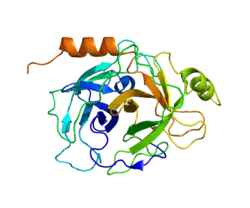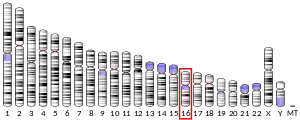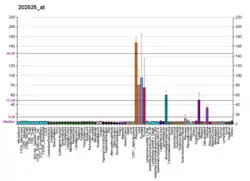PRSS8
Prostasin is a protein that in humans is encoded by the PRSS8 gene.[5][6][7]
| PRSS8 | |||||||||||||||||||||||||||||||||||||||||||||||||||
|---|---|---|---|---|---|---|---|---|---|---|---|---|---|---|---|---|---|---|---|---|---|---|---|---|---|---|---|---|---|---|---|---|---|---|---|---|---|---|---|---|---|---|---|---|---|---|---|---|---|---|---|
 | |||||||||||||||||||||||||||||||||||||||||||||||||||
| |||||||||||||||||||||||||||||||||||||||||||||||||||
| Identifiers | |||||||||||||||||||||||||||||||||||||||||||||||||||
| Aliases | PRSS8, CAP1, PROSTASIN, protease, serine 8, serine protease 8 | ||||||||||||||||||||||||||||||||||||||||||||||||||
| External IDs | OMIM: 600823 MGI: 1923810 HomoloGene: 20613 GeneCards: PRSS8 | ||||||||||||||||||||||||||||||||||||||||||||||||||
| |||||||||||||||||||||||||||||||||||||||||||||||||||
| |||||||||||||||||||||||||||||||||||||||||||||||||||
| |||||||||||||||||||||||||||||||||||||||||||||||||||
| |||||||||||||||||||||||||||||||||||||||||||||||||||
| |||||||||||||||||||||||||||||||||||||||||||||||||||
| Wikidata | |||||||||||||||||||||||||||||||||||||||||||||||||||
| |||||||||||||||||||||||||||||||||||||||||||||||||||
This gene encodes a trypsinogen, which is a member of the trypsin family of serine proteases. This enzyme is highly expressed in prostate epithelia and is one of several proteolytic enzymes found in seminal fluid. The proprotein is cleaved to produce a light chain and a heavy chain which are associated by a disulfide bond. It is active on peptide linkages involving the carboxyl group of lysine or arginine.
The protein is implicated in epithelial sodium channel regulation[8] and may help regulate a variety of tissue functions that involve a sodium channel.[9]
High prostasin plasma levels may be associated with a higher risk for diabetes and death from cancer, especially in people with high blood sugar.[10]
References
- GRCh38: Ensembl release 89: ENSG00000052344 - Ensembl, May 2017
- GRCm38: Ensembl release 89: ENSMUSG00000030800 - Ensembl, May 2017
- "Human PubMed Reference:". National Center for Biotechnology Information, U.S. National Library of Medicine.
- "Mouse PubMed Reference:". National Center for Biotechnology Information, U.S. National Library of Medicine.
- Yu JX, Chao L, Ward DC, Chao J (Mar 1996). "Structure and chromosomal localization of the human prostasin (PRSS8) gene". Genomics. 32 (3): 334–40. doi:10.1006/geno.1996.0127. PMID 8838796.
- Yu JX, Chao L, Chao J (Jun 1995). "Molecular cloning, tissue-specific expression, and cellular localization of human prostasin mRNA". The Journal of Biological Chemistry. 270 (22): 13483–9. doi:10.1074/jbc.270.22.13483. PMID 7768952.
- "Entrez Gene: PRSS8 protease, serine, 8".
- Koda A, Wakida N, Toriyama K, Yamamoto K, Iijima H, Tomita K, Kitamura K (Apr 2009). "Urinary prostasin in humans: relationships among prostasin, aldosterone and epithelial sodium channel activity". Hypertension Research. 32 (4): 276–81. doi:10.1038/hr.2009.6. PMID 19262497.
- Zhu H, Guo D, Li K, Yan W, Tan Y, Wang X, Treiber FA, Chao J, Snieder H, Dong Y (Sep 2008). "Prostasin: a possible candidate gene for human hypertension". American Journal of Hypertension. 21 (9): 1028–33. doi:10.1038/ajh.2008.224. PMC 3812941. PMID 18583984.
- Bao X, Xu B, Muhammad IF, Nilsson PM, Nilsson J, Engström G (August 2022). "Plasma prostasin: a novel risk marker for incidence of diabetes and cancer mortality". Diabetologia. 65 (10): 1642–1651. doi:10.1007/s00125-022-05771-w. PMC 9477896. PMID 35922613.
Further reading
- Yu JX, Chao L, Chao J (Jul 1994). "Prostasin is a novel human serine proteinase from seminal fluid. Purification, tissue distribution, and localization in prostate gland". The Journal of Biological Chemistry. 269 (29): 18843–8. doi:10.1016/S0021-9258(17)32244-5. PMID 8034638.
- Nelson PS, Gan L, Ferguson C, Moss P, Gelinas R, Hood L, Wang K (Mar 1999). "Molecular cloning and characterization of prostase, an androgen-regulated serine protease with prostate-restricted expression". Proceedings of the National Academy of Sciences of the United States of America. 96 (6): 3114–9. Bibcode:1999PNAS...96.3114N. doi:10.1073/pnas.96.6.3114. PMC 15904. PMID 10077646.
- Chen LM, Skinner ML, Kauffman SW, Chao J, Chao L, Thaler CD, Chai KX (Jun 2001). "Prostasin is a glycosylphosphatidylinositol-anchored active serine protease". The Journal of Biological Chemistry. 276 (24): 21434–42. doi:10.1074/jbc.M011423200. PMID 11274175.
- Donaldson SH, Hirsh A, Li DC, Holloway G, Chao J, Boucher RC, Gabriel SE (Mar 2002). "Regulation of the epithelial sodium channel by serine proteases in human airways". The Journal of Biological Chemistry. 277 (10): 8338–45. doi:10.1074/jbc.M105044200. PMID 11756432.
- Wang C, Chao J, Chao L (Apr 2003). "Adenovirus-mediated human prostasin gene delivery is linked to increased aldosterone production and hypertension in rats". American Journal of Physiology. Regulatory, Integrative and Comparative Physiology. 284 (4): R1031-6. doi:10.1152/ajpregu.00660.2002. PMID 12626364.
- Colland F, Jacq X, Trouplin V, Mougin C, Groizeleau C, Hamburger A, Meil A, Wojcik J, Legrain P, Gauthier JM (Jul 2004). "Functional proteomics mapping of a human signaling pathway". Genome Research. 14 (7): 1324–32. doi:10.1101/gr.2334104. PMC 442148. PMID 15231748.
- Tong Z, Illek B, Bhagwandin VJ, Verghese GM, Caughey GH (Nov 2004). "Prostasin, a membrane-anchored serine peptidase, regulates sodium currents in JME/CF15 cells, a cystic fibrosis airway epithelial cell line". American Journal of Physiology. Lung Cellular and Molecular Physiology. 287 (5): L928-35. doi:10.1152/ajplung.00160.2004. PMID 15246975.
- Shipway A, Danahay H, Williams JA, Tully DC, Backes BJ, Harris JL (Nov 2004). "Biochemical characterization of prostasin, a channel activating protease". Biochemical and Biophysical Research Communications. 324 (2): 953–63. doi:10.1016/j.bbrc.2004.09.123. PMID 15474520.
- Leyvraz C, Charles RP, Rubera I, Guitard M, Rotman S, Breiden B, Sandhoff K, Hummler E (Aug 2005). "The epidermal barrier function is dependent on the serine protease CAP1/Prss8". The Journal of Cell Biology. 170 (3): 487–96. doi:10.1083/jcb.200501038. PMC 2171460. PMID 16061697.
- Fan B, Wu TD, Li W, Kirchhofer D (Oct 2005). "Identification of hepatocyte growth factor activator inhibitor-1B as a potential physiological inhibitor of prostasin". The Journal of Biological Chemistry. 280 (41): 34513–20. doi:10.1074/jbc.M502119200. PMID 16103126.
- Chen M, Chen LM, Chai KX (Jun 2006). "Androgen regulation of prostasin gene expression is mediated by sterol-regulatory element-binding proteins and SLUG". The Prostate. 66 (9): 911–20. doi:10.1002/pros.20325. PMID 16541421. S2CID 23036264.
- Rohan S, Tu JJ, Kao J, Mukherjee P, Campagne F, Zhou XK, Hyjek E, Alonso MA, Chen YT (Dec 2006). "Gene expression profiling separates chromophobe renal cell carcinoma from oncocytoma and identifies vesicular transport and cell junction proteins as differentially expressed genes". Clinical Cancer Research. 12 (23): 6937–45. doi:10.1158/1078-0432.CCR-06-1268. PMID 17145811.
- Chen M, Fu YY, Lin CY, Chen LM, Chai KX (Jul 2007). "Prostasin induces protease-dependent and independent molecular changes in the human prostate carcinoma cell line PC-3". Biochimica et Biophysica Acta (BBA) - Molecular Cell Research. 1773 (7): 1133–40. doi:10.1016/j.bbamcr.2007.04.013. PMC 1950849. PMID 17532063.
Chen LM, Hatfield ML, Fu YY, Chai KX. Prostasin regulates iNOS and cyclin D1 expression by modulating protease-activated receptor-2 signaling in prostate epithelial cells. Prostate. 2009 Dec 1;69(16):1790-801. doi: 10.1002/pros.21030. PMID: 19670249.
External links
- Overview of all the structural information available in the PDB for UniProt: Q16651 (Prostasin) at the PDBe-KB.




